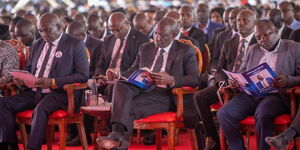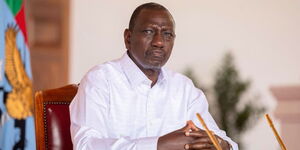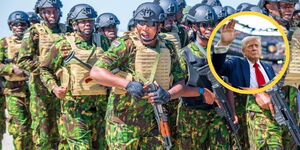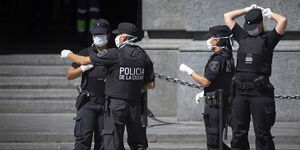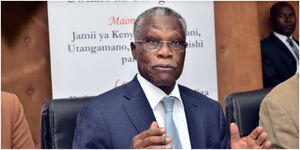The High Court in Nairobi on Wednesday directed all police officers to wear nametags and uniforms when dealing with protesters.
Bahati Mwamuye, a High Court Judge, made the ruling in connection to a suit filed on July 31 by Florence Wairimu.
"A conservatory order be and is hereby issued requiring the 5th Respondent (National Police) to ensure full compliance with Paragraph 10 of the Sixth Schedule to the National Police Service Act in terms of ensuring that all uniformed Police Officers or persons acting under the direction, control, or in support of the National Police Service shall at all times affix a nametag or an identifiable service number in a clearly visible part of their uniform when engaging with, providing security for, or in any way dealing with any person(s) who is or is planning on assembling, demonstrating, picketing, or petitioning; and they shall not remove or obscure the same," Mwamuye ruled.
The judge further directed that where plainclothes or non-uniformed Police Officers are deployed, they should not wear balaclavas or attempt to hide their identities.
In the directive, the judge further directed the National Police Service not to obscure the identification, registration, or markings of any motor vehicle used buy authorities during protests.
The suit came after some protesters accused NPS of allowing their officers to wear face masks while enforcing arrests during the anti-Finance Bill 2024 protests.
Several videos also emerged of plain-clothed individuals believed to be police officers forcefully abducting individuals.
On Tuesday, Gideon Nyale, Commandant of the Kiganjo Training College, told the press that police officers were legally allowed to wear civilian clothes even when effecting arrests.
"Operation orders are what guide us. We make decisions based on intelligence on the ground. It’s not illegal for police officers to wear civilian clothes; sometimes, they do this to gather intelligence," he stated.
"When orders are given, however, officers must make individual decisions on executing those orders. We use firearms in justifiable circumstances."
His boss, Director of Criminal Investigations Mohammed Amin, also assured the public that the police were not involved with kidnappings.
"We take those we arrest to gazetted police stations. The DCI is not involved in kidnappings. I wish I knew where the missing Kenyans are. Why would I kidnap anyone, and where would I even take them?" Amin wondered while addressing the Kenya Editors Guild.
"Some media houses are driving the agenda that the DCI is involved in kidnappings. This is not true. My conscience is clear; I am at peace with myself because I have never been involved in extrajudicial killings."



